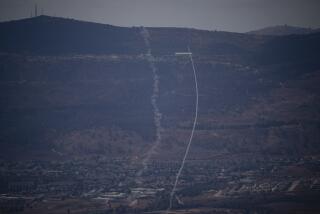Pressure Grows on Arafat for Tougher Crackdown
- Share via
BUCHAREST, Romania — International pressure is growing on Yasser Arafat to take tougher steps against Islamic militants as several countries expressed disappointment with the limited action he has taken in response to the recent surge of terrorist bombings in Israel.
The United States, Russia, European states and key Arab nations are weighing in publicly and behind the scenes on the danger of Arafat’s failure to launch a more robust crackdown. Secretary of State Colin L. Powell said bluntly Tuesday that the Palestinian leader needs to do “a lot more than he has done so far.”
“It’s a challenge we believe he must respond to,” Powell said en route to Bucharest for a 55-nation conference on European security and terrorism. “It’s a consistent message that we’re delivering to him.”
Several Arab countries are offering Arafat suggestions about what further steps he can take to demonstrate “not only 100% effort, but results that should come along with 100% effort,” Powell told reporters traveling with him. Powell did not elaborate, but U.S. officials said later that the countries included Egypt, Jordan and Saudi Arabia.
Powell has also consulted with U.N. Secretary-General Kofi Annan and European Union foreign policy chief Javier Solana. Other U.S. officials have fanned out for talks with top officials in Europe, the Mideast, Asia and Africa.
“This is the time for Chairman Arafat to use all of his influence, all of his authority, all of his prestige to bring these terrorist elements under control,” Powell said.
In an unusual move, Powell also signaled tacit U.S. support for Israel’s retaliation, which continued Tuesday with new strikes in the Gaza Strip and near Arafat’s headquarters in Ramallah. He said Prime Minister Ariel Sharon had an obligation to defend his nation and protect his people.
However, Powell said the United States has made it clear to Sharon that it still expects Israel to try to work out a peace agreement with the Palestinians.
“We have also indicated that there will be a tomorrow, and a day after tomorrow, when we have to try to get back to a process that will lead to a cease-fire and to negotiations which ultimately are required to bring these two peoples into some agreement where they can live together in peace,” Powell said at a news conference after his speech to the Organization for Security and Cooperation in Europe.
Moscow is also weighing in with the Palestinian leadership to prevent further deterioration of the situation, Russian Foreign Minister Igor S. Ivanov said after talks with Powell.
“Our task with the United States as co-sponsors [of the peace process] is to avoid the worst development,” Ivanov told reporters. “This is hard, but we need to search for a political solution. Only a political solution can help.”
Powell and Ivanov held talks with Israeli Foreign Minister Shimon Peres, who was also in Bucharest for the OSCE conference.
Arafat Moving Too Slowly, Peres Says
Peres said Arafat had not done enough to clamp down on extremists.
“He is slower than I think he should be, slower and reluctant. I think he should be more decided and more effective,” Peres told reporters traveling with Powell.
But he said Israel’s intent is not to bring down either Arafat or the Palestinian Authority.
“I don’t think there will be action against Mr. Arafat,” he said. He said Israel’s retaliation was “more of a warning than a punishment.” Israel was targeting “material, not people,” he added.
The next step is in Arafat’s hands, he said. “He should really take control over the different groups who are making the life of Palestinians miserable, dividing them, using wrongly their resources and misspending their own destiny,” he said.
The warnings came as the OSCE, a group of 55 North American, European and Asian nations, united behind a plan to fight terrorism that will greatly expand the kind of wide-ranging cooperation that the United States now has with the 15 members of the European Union.
The group, which has traditionally focused on promoting democracy and monitoring elections as nations make sensitive political transitions, will join forces to combat terrorist threats “in all forms and manifestations--by all means,” according to the final declaration issued Tuesday.
No Neutrality on Terrorism
Member states, including traditionally neutral Switzerland, declared that there is no neutrality on terrorism. All 55 nations also pledged to ratify and implement all 12 U.N. conventions on terrorism by December 2002.
The declaration is the latest success in the Bush administration’s campaign to increase the range of participants in the war against terrorism and to recruit existing organizations into the offensive by expanding their mandates. The declaration also establishes a framework for dealing with 21st century transnational threats, U.S. officials said.
“It’s quite important. There is great moral strength in having an agreed set of documents that covers the breadth of 55 countries. We’re all saying the same things about the fight against terrorism and [the] importance of taking steps together against it,” Jeff Hovenier, a U.S. negotiator, told reporters traveling with Powell.
The organization also announced plans to appoint an official to coordinate intelligence-sharing, counter-terrorism strategy and training. Richard Monk, a senior British security official who spent two years in Bosnia, is expected to take the job, diplomats said.
More to Read
Sign up for Essential California
The most important California stories and recommendations in your inbox every morning.
You may occasionally receive promotional content from the Los Angeles Times.













